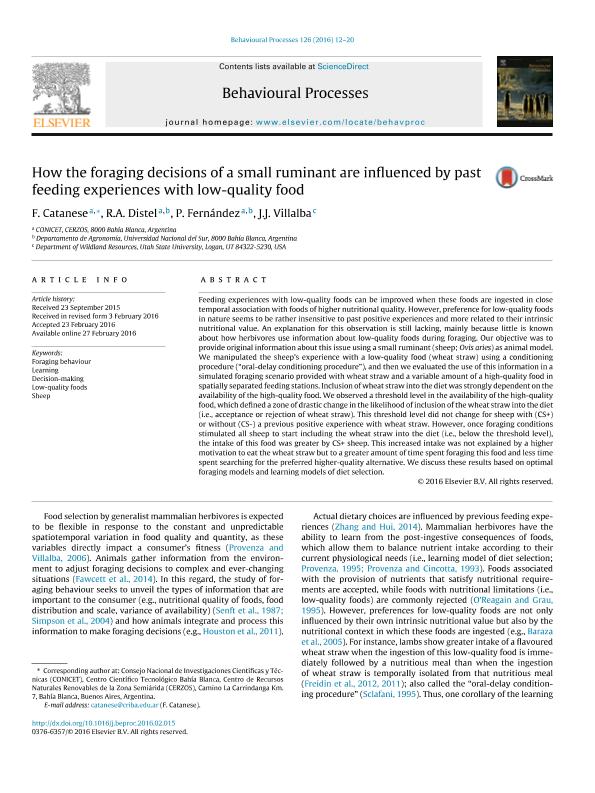Mostrar el registro sencillo del ítem
dc.contributor.author
Catanese, Francisco Hernan

dc.contributor.author
Distel, Roberto Alejandro

dc.contributor.author
Fernandez, Paola Alejandra

dc.contributor.author
Villalba, Juan Jose

dc.date.available
2017-09-28T15:50:23Z
dc.date.issued
2016-05
dc.identifier.citation
Catanese, Francisco Hernan; Distel, Roberto Alejandro; Fernandez, Paola Alejandra; Villalba, Juan Jose; How the foraging decisions of a small ruminant are influenced by past feeding experiences with low-quality food; Elsevier Science; Behavioural Processes; 126; 5-2016; 12-20
dc.identifier.issn
0376-6357
dc.identifier.uri
http://hdl.handle.net/11336/25292
dc.description.abstract
Feeding experiences with low-quality foods can be improved when these foods are ingested in close temporal association with foods of higher nutritional quality. However, preference for low-quality foods in nature seems to be rather insensitive to past positive experiences and more related to their intrinsic nutritional value. An explanation for this observation is still lacking, mainly because little is known about how herbivores use information about low-quality foods during foraging. Our objective was to provide original information about this issue using a small ruminant (sheep; Ovis aries) as animal model. We manipulated the sheep’s experience with a low-quality food (wheat straw) using a conditioning procedure (“oral-delay conditioning procedure”), and then we evaluated the use of this information in a simulated foraging scenario provided with wheat straw and a variable amount of a high-quality food in spatially separated feeding stations. Inclusion of wheat straw into the diet was strongly dependent on the availability of the high-quality food. We observed a threshold level in the availability of the high-quality food, which defined a zone of drastic change in the likelihood of inclusion of the wheat straw into the diet (i.e., acceptance or rejection of wheat straw). This threshold level did not change for sheep with (CS+) or without (CS-) a previous positive experience with wheat straw. However, once foraging conditions stimulated all sheep to start including the wheat straw into the diet (i.e., below the threshold level), the intake of this food was greater by CS+ sheep. This increased intake was not explained by a higher motivation to eat the wheat straw but to a greater amount of time spent foraging this food and less time spent searching for the preferred higher-quality alternative. We discuss these results based on optimal foraging models and learning models of diet selection.
dc.format
application/pdf
dc.language.iso
eng
dc.publisher
Elsevier Science

dc.rights
info:eu-repo/semantics/openAccess
dc.rights.uri
https://creativecommons.org/licenses/by-nc-sa/2.5/ar/
dc.subject
Foraging Behaviour
dc.subject
Learning
dc.subject
Decision-Making
dc.subject
Low-Quality Foods
dc.subject
Sheep
dc.subject.classification
Otras Producción Animal y Lechería

dc.subject.classification
Producción Animal y Lechería

dc.subject.classification
CIENCIAS AGRÍCOLAS

dc.title
How the foraging decisions of a small ruminant are influenced by past feeding experiences with low-quality food
dc.type
info:eu-repo/semantics/article
dc.type
info:ar-repo/semantics/artículo
dc.type
info:eu-repo/semantics/publishedVersion
dc.date.updated
2017-07-27T12:25:41Z
dc.journal.volume
126
dc.journal.pagination
12-20
dc.journal.pais
Países Bajos

dc.journal.ciudad
Amsterdam
dc.description.fil
Fil: Catanese, Francisco Hernan. Consejo Nacional de Investigaciones Científicas y Técnicas. Centro Científico Tecnológico Conicet - Bahía Blanca. Centro de Recursos Naturales Renovables de la Zona Semiárida. Universidad Nacional del Sur. Centro de Recursos Naturales Renovables de la Zona Semiárida; Argentina
dc.description.fil
Fil: Distel, Roberto Alejandro. Consejo Nacional de Investigaciones Científicas y Técnicas. Centro Científico Tecnológico Conicet - Bahía Blanca. Centro de Recursos Naturales Renovables de la Zona Semiárida. Universidad Nacional del Sur. Centro de Recursos Naturales Renovables de la Zona Semiárida; Argentina
dc.description.fil
Fil: Fernandez, Paola Alejandra. Consejo Nacional de Investigaciones Científicas y Técnicas. Centro Científico Tecnológico Conicet - Bahía Blanca. Centro de Recursos Naturales Renovables de la Zona Semiárida. Universidad Nacional del Sur. Centro de Recursos Naturales Renovables de la Zona Semiárida; Argentina
dc.description.fil
Fil: Villalba, Juan Jose. University of Utah; Estados Unidos
dc.journal.title
Behavioural Processes

dc.relation.alternativeid
info:eu-repo/semantics/altIdentifier/url/http://www.sciencedirect.com/science/article/pii/S0376635716300365
dc.relation.alternativeid
info:eu-repo/semantics/altIdentifier/doi/http://dx.doi.org/10.1016/j.beproc.2016.02.015
Archivos asociados
